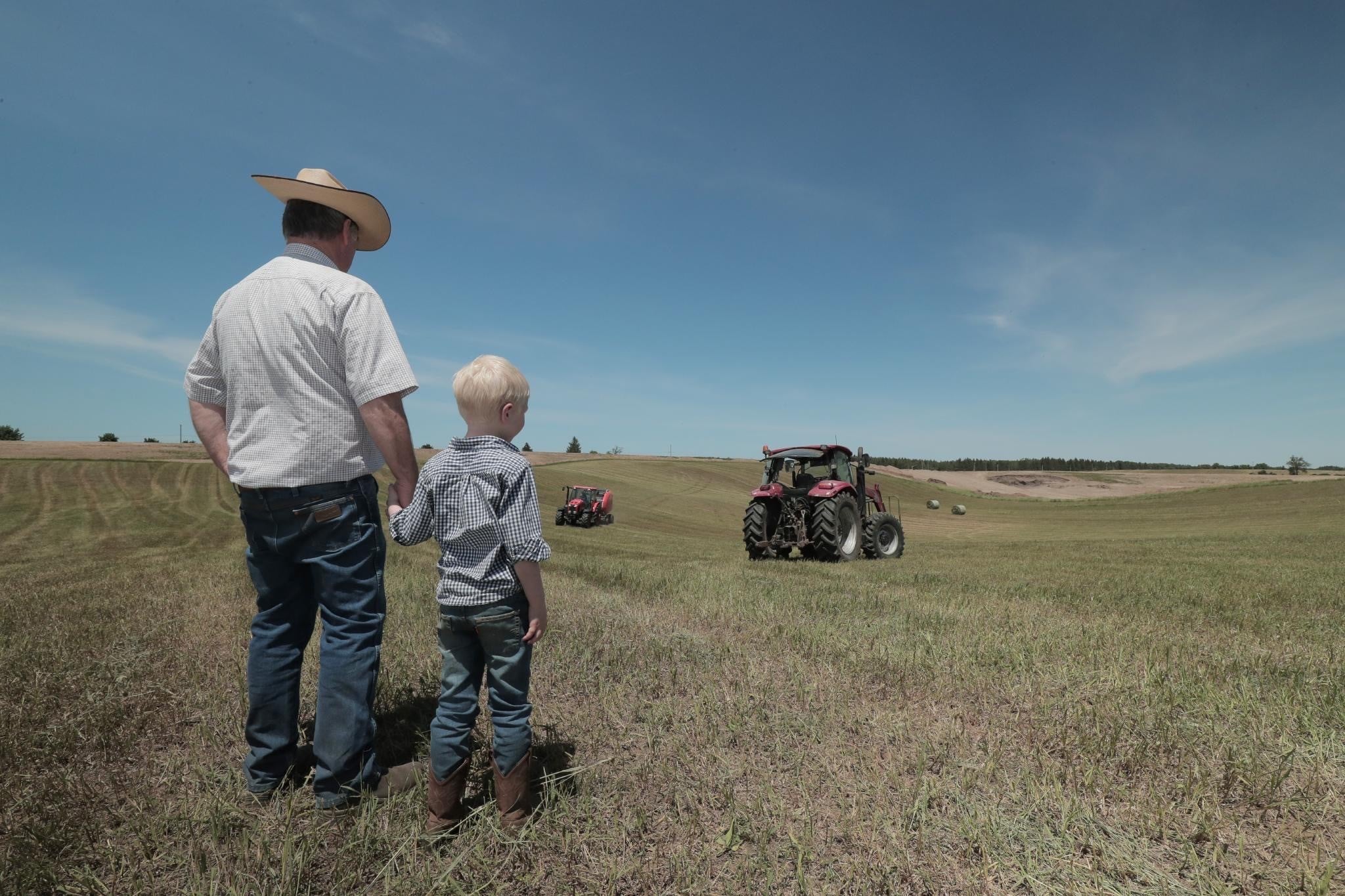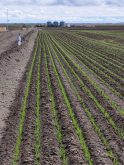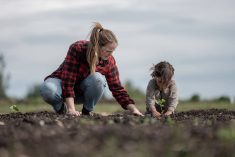The two desks of Kristin Ego-MacPhail and Gary MacPhail sit beside each other, tidy and yet stacked with business as their hectic farm market season winds down.
This small office is the interface between production and business at Ego’s Nurseries, Garden Centre and Farm Market near Orillia, an hour or so north of Toronto, where the couple has given themselves a business mandate to pursue professional development.
It’s not like they have nothing else to do. Ego’s, started by Kristin’s parents Laury and Lorraine as a roadside stand in 1975, is a busy, thriving place. Some 18,000 sq. ft. of heated greenhouses and 24,000 sq. ft. of outdoor container growing area and cold frames stretch out behind the farm market.
Read Also

Where convention and innovation meet
How one Ontario farm is integrating technology into their beef operation.
Not only do the husband and wife team sell direct, Ego’s Nurseries also contract grows for landscape and gardening operations.
Kristin and Gary purchased the business in 2006. Gary does the bookkeeping and has a degree in economics from Western University.
For her part, with her B.Sc. in agriculture from the University of Guelph, Kristin says, “I’ve always focused on production… on doing a better job at growing.”
Last year, however, Kristin decided it was time to sharpen her business skills, and she signed up for the new Advanced Farm Management Program (AFMP).
Ego-MacPhail was one of 34 farmers in the course. Other options exist in other provinces, but in this particular case, it’s a course offered by the Agricultural Management Institute in partnership with the Ontario Soil and Crop Improvement Association, consisting of a series of one-day programs. Having the days spread out over the winter was more manageable for business and family. However, by the end of the course in April their greenhouse production was in full swing.
This year the course is six days at three locations and costs $2,400. Half of the tuition can be covered through the Growing Your Farm Profits funding. Farmers who have completed the GYFP program or who have accumulated management experience are encouraged to enrol, says Maureen Hinz, project manager at Synthesis Agri-Food Network.
The AFMP curriculum was designed through consultation with farmers who participated in the Grow Your Farm Profits (GYFP) program. Synthesis from Guelph was contracted by the AMI and OSCIA to develop and deliver the material. Three or four years of accountant-prepared financial statements on an accrual basis are required in order to get the full benefit of AFMP. “Attendees should be farm business owners or managers with a solid understanding of the farm financial results,” says Rob Hannam, president of Synthesis Agri-Food Network.
Hannam and Mike Bossy, president of Bossy Nagy Geoffrey Group Chartered Accountants, teach how to understand key ratios, build an effective human resources plan, benchmark financial performance, lead change and execute a management plan. How to structure your business, plan for the next generation, leverage innovation and develop productive communications are also on the agenda.
Participants emerge with a strategic approach to their business, and understand how planning can make them more proactive and less reactive, says Hannam.
From the Grainews website: Time logs to track farm workloads
Kristin found the course gave her the tools to link her farm’s financial information to ways to improve her business. Not only was she learning ratios and red flags, she used her own farm’s information so it was applicable in minutes. “By constantly tying it back to the big picture, and how to make it better, it finally made sense to me,” says Kristin. “Some areas were challenging, but nothing was overwhelming.”
Through lessons, case studies and discussion, each participant looks at the topics as they apply to their own farm — from analyzing their own accrual statements to what business structures would work for their operation to how they each communicated. Participants learn enterprise analysis. They also gain a solid understanding of financial statements and financial ratios, Hinz says, and they learn how to build a financial scorecard for the last three years that will help set and measure their performance against financial targets for the future.
Unlike the fill-in-the-chart assignments with GYFP, there wasn’t as much homework, says Kristin. However, when she got home, she was eager to share the information with Gary, reviewing and talking about what she had learned about their business. Although he was already good with the numbers, they began to look together at how to make changes. It helped them identify their own farm’s key issues.
By quantifying and comparing their biggest expenses it helped put a better spotlight on costs, says Kristin. For example, with 12 employees, mostly seasonal, she saw how significant the management of their human resources is to the profitability of their farm. Knowing their HR ratio (cost of employees over gross sales) inspired her to track down some benchmarking statistics through Landscape Ontario for other similar-size operations in their industry.
This winter, she’s going to look at their marketing, as well as developing some measurables to find out what’s effective and what provides value.
Back at the office, the McPhails are finding that their professional development commitment is kickstarting more effective planning. By having a forecasted budget for two years based on the past and their action plans, she and Gary can set more specific goals, says Kristin. For example, if they set a target to decrease their human resources budget, they sit down and come up with several ways to get there. Then they select which specific way would be the best to reach this goal.
While taking the course, Kristin adds, instructors were available by email or telephone at designated times to explore detailed questions. This was an invaluable resource, says Kristin.
The next time the group met, the leaders would recap what they learned in the previous session and the group would discuss it. For some of the participants it meant talking about the difficulties they came across trying to make changes, such as succession. Although they all came from a variety of different types of farms, they were all full-time farmers.
“It was very inspirational for me to be among the group,” says Kristin. “It helps for people to talk about it, to identify with others in the group.”
The lesson on how individuals communicate, learn and process was Kristin’s eureka moment. That night, after she did the Kolbe self-awareness assessment, she went home and got Gary to go through it too. It was so profound for them that they stuck a hard copy of their results on their desks as a reminder. “It really explained why we looked at problems so differently,” she says.
Kristin says that with the course, she and Gary are better prepared to go to their lending agent, and their annual planning is more effective too. She has a deeper understanding of how their numbers affect their farm’s profitability as well, so she’s more confident and motivated to delve into them.
The McPhails do a basic weekly report on sales and expenses including labour. It’s a strategy they got from a peer group of similar farmers who share ideas but are at least two hours away from each other so they are not in competition. They meet a couple of times a year in person, or have Skype conference calls.
“Although it’s basic, it gives me a good snapshot and helps us keep a tab on any changes,” says Kristin.
She almost sounds like she should be sitting at a desk in downtown Toronto, but she looks up and smiles at her husband at the other desk in their small office. Then she asks him what he thinks, and listens to his response intently and with understanding. This is powerful.
— Maggie Van Camp is an associate editor with Country Guide and a farmer at Blackstock, Ont. This article appears in the November 2013 issue of Country Guide.














